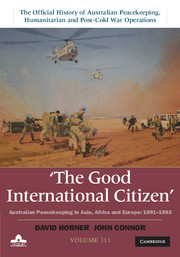Book contents
- Frontmatter
- Contents
- Maps
- Preface
- Chronology 1989–99
- Abbreviations
- Part 1 Strategy and policy
- Part 2 Cambodia
- Part 3 Western Sahara
- Part 4 Former Yugoslavia
- Part 5 Watch on Iraq
- 16 A new type of commitment
- 17 Disarming Iraq
- 18 A limited liability
- 19 Unscom and the US alliance
- Conclusion
- Appendix A United Nations Security Council resolutions
- Appendix B Major office bearers, 1991–99
- Bibliography
- Index
- Plate section
- References
18 - A limited liability
Australia and the hunt for Saddam's weapons, 1993–97
from Part 5 - Watch on Iraq
Published online by Cambridge University Press: 12 May 2022
- Frontmatter
- Contents
- Maps
- Preface
- Chronology 1989–99
- Abbreviations
- Part 1 Strategy and policy
- Part 2 Cambodia
- Part 3 Western Sahara
- Part 4 Former Yugoslavia
- Part 5 Watch on Iraq
- 16 A new type of commitment
- 17 Disarming Iraq
- 18 A limited liability
- 19 Unscom and the US alliance
- Conclusion
- Appendix A United Nations Security Council resolutions
- Appendix B Major office bearers, 1991–99
- Bibliography
- Index
- Plate section
- References
Summary
By the beginning of 1993 Unscom had been operating for eighteen months. It had been a time of discovery or, as a senior Unscom official put it, the period was ‘frenetic but full of purpose’. Initially Iraq had appeared to cooperate and much was achieved, particularly with the beginning of the program to destroy Iraq's chemical weapons, missiles and nuclear facilities. But before long Iraq had actively resisted Unscom's more probing inspections. The big question was whether the Security Council would authorise the coalition to use military force against Iraq to encourage it to abide by its successive resolutions. Already it was clear that while trade sanctions were deeply hurting the everyday life of most Iraqis, they were not influencing Saddam Hussein's determination to thwart the Unscom inspections.
For four years, 1993 to 1997, Unscom was to engage in a cat-and-mouse game with Iraq. In some areas, such as the chemical weapons destruction program and its eventual approval of the ongoing monitoring and verification (OMV) regime, Iraq appeared cooperative; but Unscom did not accept Iraq's claims that it had no biological weapons program. The other worrying aspect was evidence that Iraq had established a sophisticated organisation specifically to hide its WMD, and Unscom's efforts to uncover this program would lead to major confrontations. All the while the MNF needed to maintain the trade sanctions. Eventually, however, this period of confrontation began to change. As international support for the sanctions regime waned, Iraq became emboldened, and whereas previously Unscom had been confronting Iraq, in late 1997 Iraq began to confront the United Nations. Iraq claimed, with some justification, that the United States was determined to maintain sanctions whatever Unscom reported and that it was using Unscom to spy on Iraq. (The outcome, with the demise of Unscom, will be described in chapter 19.)
- Type
- Chapter
- Information
- The Good International CitizenAustralian Peacekeeping in Asia, Africa and Europe 1991–1993, pp. 463 - 500Publisher: Cambridge University PressPrint publication year: 2014

